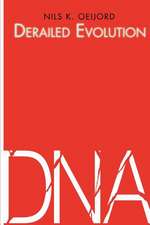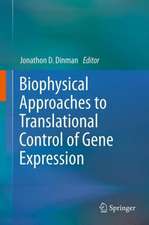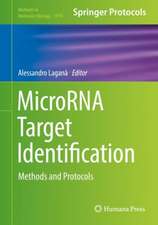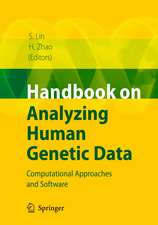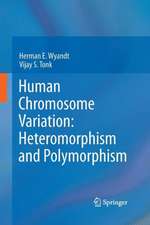Transcriptional and Epigenetic Mechanisms Regulating Normal and Aberrant Blood Cell Development: Epigenetics and Human Health
Editat de Constanze Bonifer, Peter N. Cockerillen Limba Engleză Hardback – 26 mar 2014
| Toate formatele și edițiile | Preț | Express |
|---|---|---|
| Paperback (1) | 1101.73 lei 6-8 săpt. | |
| Springer Berlin, Heidelberg – 23 aug 2016 | 1101.73 lei 6-8 săpt. | |
| Hardback (1) | 1106.69 lei 6-8 săpt. | |
| Springer Berlin, Heidelberg – 26 mar 2014 | 1106.69 lei 6-8 săpt. |
Preț: 1106.69 lei
Preț vechi: 1164.93 lei
-5% Nou
Puncte Express: 1660
Preț estimativ în valută:
211.76€ • 221.69$ • 175.22£
211.76€ • 221.69$ • 175.22£
Carte tipărită la comandă
Livrare economică 05-19 aprilie
Preluare comenzi: 021 569.72.76
Specificații
ISBN-13: 9783642451973
ISBN-10: 3642451977
Pagini: 432
Ilustrații: XIII, 416 p. 49 illus. in color.
Dimensiuni: 155 x 235 x 30 mm
Greutate: 0.73 kg
Ediția:2014
Editura: Springer Berlin, Heidelberg
Colecția Springer
Seria Epigenetics and Human Health
Locul publicării:Berlin, Heidelberg, Germany
ISBN-10: 3642451977
Pagini: 432
Ilustrații: XIII, 416 p. 49 illus. in color.
Dimensiuni: 155 x 235 x 30 mm
Greutate: 0.73 kg
Ediția:2014
Editura: Springer Berlin, Heidelberg
Colecția Springer
Seria Epigenetics and Human Health
Locul publicării:Berlin, Heidelberg, Germany
Public țintă
ResearchCuprins
Preface.- Introduction.- Non-mammalian hematopoiesis.- Epigenetic mechanisms regulating mammalian hematopoietic stem cell development and function.- Epigenetic and transcriptional mechanisms regulating cell fate decisions and blood cell lineage development.- Epigenetic control of immune cell function.- Subject index.
Textul de pe ultima copertă
In recent years, great progress has been made in the identification of the molecular players involved in the epigenetic control of gene expression during development. The work of many laboratories has established that regulating the interplay of transcription factors with chromatin components is the major driver of cellular differentiation. Because of their single cell nature and ease of purification, much of what we have learnt about these processes in animals has been delivered based on cellular models within the hematopoietic system. The blood cell system evolved from a few simple cell types in more primitive organisms that provide oxygen transport and carry out phagocytosis into the complex hematopoietic system of mammals, containing many specialized cells types with vastly different functions, such as B cells, T cells, granulocytes, macrophages, erythrocytes, and megakaryocytes. This book describes the intricate processes involved in the development of blood cells across a range of organisms from drosophila and fish at one end, and mammals at the other end. It contains individual chapters devoted to describing the epigenetic and transcriptional mechanisms regulating hematopoiesis in the different organisms and orchestrating the differentiation of a wide variety of cell types. Different chapters describe the function of lymphocytes, macrophages and red blood cells and the molecular players, i.e. transcription factors and the epigenetic regulatory machinery driving their differentiation. Most importantly, the book not only describes normal processes, such as the rearrangements of antigen receptor genes, and the regulation of genes by various mechanisms such as DNA methylation, but also outlines what happens when these processes function abnormally to precipitate diseases such as leukemia and immune disorders.
Caracteristici
Translational aspect: describes how immune cell function is controlled and highlights human diseases where this is dysfunctional From animal models to humans: Describes how more primitive organisms use the epigenetic regulatory machinery and explains what controls the function of specialized cells of the human immune system With extensive glossary Includes supplementary material: sn.pub/extras











